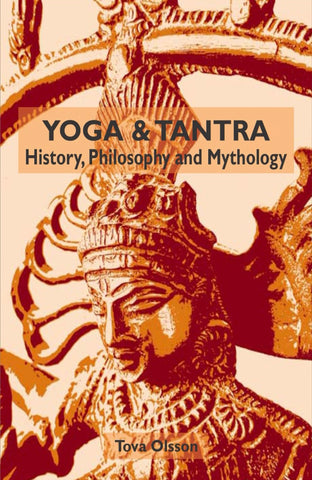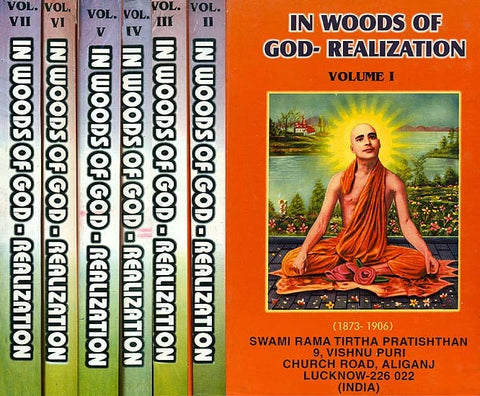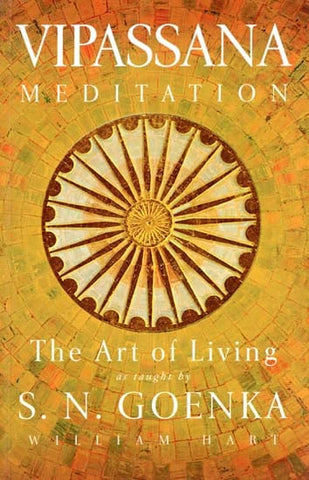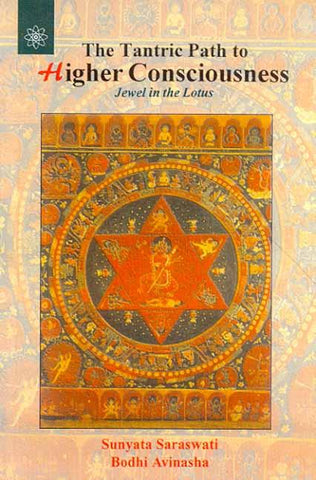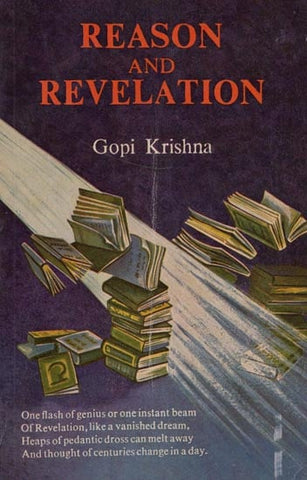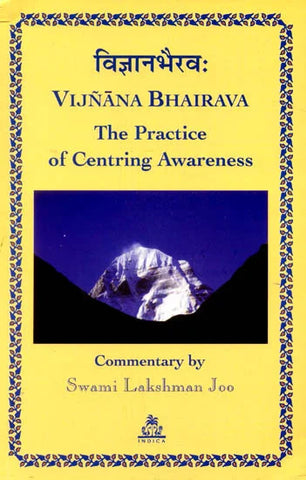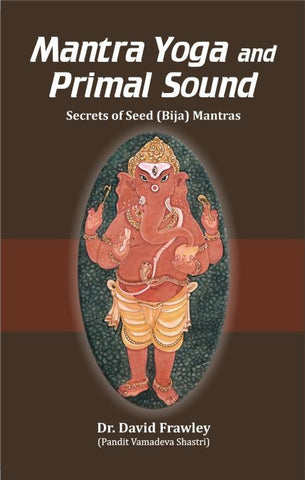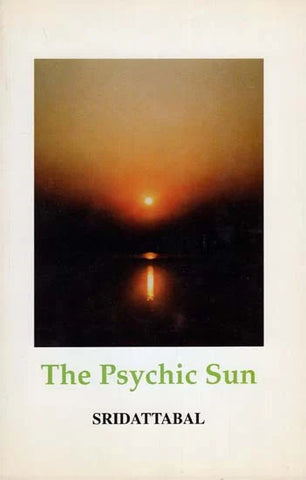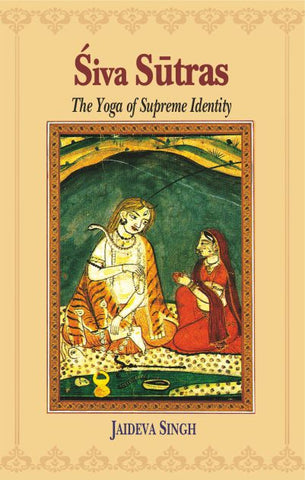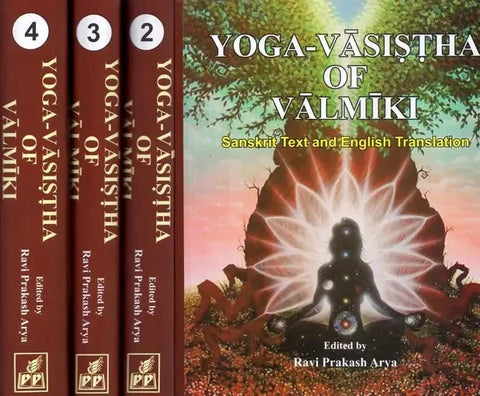Your cart is empty now.
Vedic Yoga is the ancient system of integral Yoga shaped by the Vedic Rishis. These Rishis devoted to a life of the Spirit discovered a certain line of development beyond the range of sensory perception by means of their strength of self-discipline and achieved many-sided inner progress. Whatever they achieved by their Tapasya (meditative concentration) they then cast into a veiled language that they called Mantra. It is through these Rishis that the secret words of the Vedas were revealed. The Rishis had the inner vision to see the light of truth (rsyah mantradrastarah) and the inner audition to hear the voice of the truth (satyasrutah). They possessed both great spiritual and occult knowledge, the complete inner wisdom.
This vision and ideal of the Rishis and the Vedic system of Yoga need to be recovered today and given a new form suitable to the modern mind in the present challenging human situation. It is in this context this book throws much light not just on the ways of the ancient Rishis, but on the whole of the Rishi tradition from ancient to modern periods especially the roles of Ganapati Muni and Sri Aurobindo, both of whom the author has been connected with for several decades.
This profound and intricate book from a great Vedic master can serve as a guide to total well-being and complete enlightenment. - Deepak Chopra, M.D.
Vedic Yoga is not a mere academic exercise since it is informed by Frawley's own personal spiritual journey which is described charmingly in the autobiographical sections of the book. - Subhash Kak, Regents Professor at Oklahoma State University and author of Mind and Self.
Vamadeva provides a profound understanding of the play of Agni and Soma... and how we can bring about the inner state of enlightenment. This book is an important guide for all those who seek Self-realization. - Vasant Lad, author of Ayurveda: Science of Self-Healing, Textbook of Ayurveda and Director of the Ayurvedic Institute.
Vedic Yoga is a treasure for every serious practitioner of Yoga. With profound insight, Acharya Vamadeva (Dr Frawley) reveals the practical yogic secrets hidden within the symbolism of the Vedas and brings forth the power of the Vedic mantras for developing the cosmic forces of higher awareness within each person. - Gyandev McCord, author of Spiritual Yoga: Awakening to Higher Awareness Co-founder of Yoga Alliance.
Frawley conclusively draws a connection between classical Yoga and early Vedic teachings, an issue that has been of some controversy in recent years. His book is a necessary reference for all those who are interested in yoga in the deeper sense to see the Vedic roots of Yoga Philosophy. - Stephen Knapp, the author of numerous books on Vedic culture.
By interpreting the most ancient of sacred texts in the light of modern knowledge and contemporary needs, Vedic Yoga connects today's yogis to the legendary rishis whose Himalayan insights formed the foundation of India's glorious spiritual heritage. Thought-provoking, revelatory, and pregnant with practical implications, Frawley's brave book should be cherished by spiritual aspirants of all traditions and paths. - Philip Goldberg, author of American Veda: From Emerson and the Beatles to Yoga and Meditation, How Indian Spirituality Changed the West.
About the Author
David Frawley (Vamadeva Shastri) is one of the few Westerners recognized in India as a Vedacharya or teacher of ancient Vedic wisdom. He is the author of numerous books and articles on Vedic Topics including Ayurveda, Vedic Astrology, Vedanta, Hinduism, Yoga and Tantra, as well as translations and interpretations from the Vedas. Dr. Frawley has been given many awards for his work in India including the Veda Vyasa Award by the International Institute of India Studies. He is a Jyotish Kovid through the Indian Council of Astrological Sciences, and is also the President of the American Council of Vedic Astrology, the American offshoot of the Indian council; He has a Doctorês degree in Chinese Medicine and has also been certified as an expert through the University of Poona for his knowledge of Yoga and Ayurveda. He is presently the Director of the American Institute of Vedic Studies.
The Rigveda is the oldest and probably most important of the ancient texts of India, the spiritual motherland of humanity, and its great traditions of Yoga, mantra, and meditation. The Rigveda is the longest and most diverse of the ancient scriptures of the world that have survived to the present day. This makes the Rigveda a central part of our ancient global spiritual heritage filled with many secrets about our past and perhaps keys to our future, yet the Rigveda remains probably the least understood of all the world's great scriptures, and the most in need of a new examination.
This situation of neglect is not surprising, as the Rigveda is composed in an ancient secret mantric code that is very difficult to decipher, the language of another yuga or world age, whose mentality and world view we no longer share, or even suspect. This means that a new examination of the Rigveda - particularly from a yogic standpoint - is essential for understanding our origins, as well as the place of religion, mysticism, and Yoga in human culture. A new study of the Rigveda is crucial today as we seek to understand our nature as a species and for developing a higher consciousness.
Looking into the Rigveda can provide us with a great adventure in historical studies, spiritual research, and meditation practice, widening our view of life and expanding our awareness on all levels. The Rigveda offers us the transformative vision of numerous ancient sages and Rishis in a special language of cosmic sound and symbol that is perhaps unparalleled and uniquely preserved in the world. It can help us create a global spiritual culture that honours the eternal truth in all of its forms and manifestations throughout nature and society.
In this book, we will examine the core knowledge of the older Vedic Yoga that occurs in the Rigveda, and endeavour to make it accessible. For our modern mind and its language. This Vedic Yoga is not only the possible origin of classical Yoga but of all the dharmic traditions of India's great civilization. Understanding Vedic Yoga will help us to approach Rigveda in its true depth and cosmic power.
In this book, I approach ancient Vedic knowledge from several angles, traditional and modern, both in terms of Indian thought and the new global culture arising today. Naturally a single book on such a vast topic as the Vedas cannot deal with everything and will raise many questions. Additional research will be necessary to bring out the Vedic vision in its full scope.
It is difficult to find accessible books in the English language on Vedic Yoga, though many people may recognize the Vedas as the source of the Yoga tradition. Often the term "Veda" is used in a generic way to refer to later texts like the Bhagavad Gita and Upanishads. It is little available in print on the Rigveda itself, the main Vedic text, apart from academic translations that are largely oblivious to the yogic meaning of the mantras, literalistic in their approach, and generally quite uninspiring. The current volume is meant to help fill that gap and to encourage a new yogic study throughout the Vedic field.
The purpose of this book is to teach the principles and practices of Vedic Yoga so that individuals today can take up its profound teachings as part of their own practice. The book does not look at the Vedas in isolation but indicates how later Yoga, Tantra, Vedanta, and the Vedic Sciences can be found in seed form in the Vedas, and how these teachings represent different aspects of the older Vedic knowledge.
The book represents several decades of research and meditation and reflects extensive previous work. I began studying the hymns of the Rigveda in 1970 and translating them in 1978, producing several volumes of Vedic translations up to 1984. After that time my focus was more on specialized studies of Yoga, Vedic sciences, and Vedic history. Now I wish to update that earlier work with a specific book on Vedic Yoga, particularly the Yoga of the Rigveda, the primary Vedic text. While the other Vedas - Yajur, Sama, and Atharva Veda - have a yogic relevance, the current volume will emphasize the Rigveda in order to show how yogic teachings are integral to the oldest of the Vedas, not something new that developed over time.
I have drawn inspiration and support from a number of great modern Vedic teachers who I have studied and worked with. I hope that readers will examine these important teachers and their teachings. This book is also about the modem Vedic Yoga that has developed in India over the past two centuries and discusses its approaches, including how it has influenced India and the world as a whole.
Owing to the limits of space, I have included only a small number of translations from Vedic hymns. An older book of mine can be consulted for these, Wisdom of the Ancient Seers, which contains translations of over eighty hymns of the Rigveda from a yogic and Vedantic perspective. I hope to bring out additional volumes of Vedic translations in the future that reflect what I have learned about the teachings since that earlier book.
I have not addressed in detail the historical implications and the new view of ancient India. That occurs in other published books of mine, notably Gods, Sages and Kings: Vedic Secrets of Ancient Civilization, and Hidden Horizons: Unearthing Ten Thousand Years of Indian Culture, as well as in the books of many other authors in the field.
Om!
From the words of the poet,
"Men take what meanings please them, yet their last meaning points to Thee."
The above saying of the great poet Rabindranath Tagore is completely true in the case of the Vedas, ancient India's mantric books of Divine truth. As the Atharvaveda says about the Veda: "It has not left out anything that never dieth and never decays."
The most important point I wish to make is not about the interpretation of the Vedas but their source in the deepest states of meditation. We hear in the Rigveda:
Inspired wise poets (kavi), they of deep meditation, obtain the words and the highest state. Protecting it, the ever-undecaying one, in many ways, from the heart.
Seeking to find they have seen the ocean and for these humans the sun revealed itself.
Dirghatamas Auchatya, Rigveda 1.146.4
There is a very detailed theory of such mantric revelation in the ancient Sanskrit philosophy of language. This revelation occurs in the depths of consciousness where from it pours having found the form of words. The words are a covering for the revealed reality, and only by unveiling it through meditation can one remove the word-covering and see the truth for what it is in all its glory. Thus only a Rishi can understand the language of the Rishi and otherwise, we can only scratch the surface. If not fully a Rishi, we must be deep meditators in order for the true meaning to dawn on us.
There are instances of later Rishis such as Ananda Tirtha, Swami Dayananda, and Sri Aurobindo who have seen the meanings of the Vedas and given spiritual translations of Vedic hymns. I have also come across a few lesser-known figures.
Vamadeva mentions Maharshi Daivarata in his book. Two important Vedic works of Daivarata are available to us and other works of his, like Yoga-Sudha, lie unpublished. Yak Sudha is his versified commentary in over a thousand poetic verses, on select hymns and terms of the Rigveda. Unfortunately, no English translation is available. Daivarata's magnum opus Chandodarshana consists of four hundred and fifty revealed mantras from him in the Rigvedic language. These have been translated into English and include a Sanskrit commentary by his own great guru Sri Vasishtha Ganapati Muni, whose line of teachings goes back to Bhagavan Ramana Maharshi. The Muni created several new Vedic verses of his own as well, among his many other profound Sanskrit poetic and philosophical works of seer inspiration.
The foremost point in trying to understand the diction of the Vedas, as we have said at the beginning, is to reside in the same state of meditation in which the mantra was first revealed to the Rishi. The second most important point is to understand that all Vedic mantra meanings are multi-layered and cannot just be reduced to one level only.
In commenting on the revelations of Maharshi Daivarata, Sri Ganapati Vasishtha Muni has followed the second point. For example, in the first mantra of Daivarata, the Muni has explained the word Mitra in six layers of the word and also cross-referenced these with other citations of the Vedas.
I was at one time preparing a dictionary of the Vedas from 1946, not completed and not published. It was based on the principle that the Vedas themselves, and not grammar and etymologies, are the best source of Vedic interpretation. I now look for scholars who will complete that work under my direction, and also, if funding can be found. Ganapati Muni, to my delight, has also resorted to the same principle of understanding the Veda primarily through the Veda, as does Vamadeva in the current book. This kind of analysis of translations and interpretations by those who have the Vedic vision can take five decades or more and yet the depth of the Vedas will still not be fully fathomed.
Vamadeva mentions in this current book on Vedic Yoga another contemporary teacher to whom Vedic mantras have been revealed, referring to my own work and writings. Swami Veda Bharati has so far published over three of these mantras (Divo Duhita, Chaukhamba, Delhi, 2013) and many more lie unpublished in addition to the ones that keep dawning on him from time to time. A translator/disciple is awaited to whom he may hand the keys to the interpretation of these mantras.
Here we render only a unilateral translation of a randomly selected unpublished mantra from Divo Duhita:
As the words shine forth in splendour,
The manifest and unmanifest ones, mixed and unmixed,
Yoked in yoga together with the suns 'horses,
May we, entering within, becoming one with universal truths,
Contemplate on these honeyed ones.
Giving multi-layer meanings of the four
lines could easily take dozens of pages.
Sample Pages
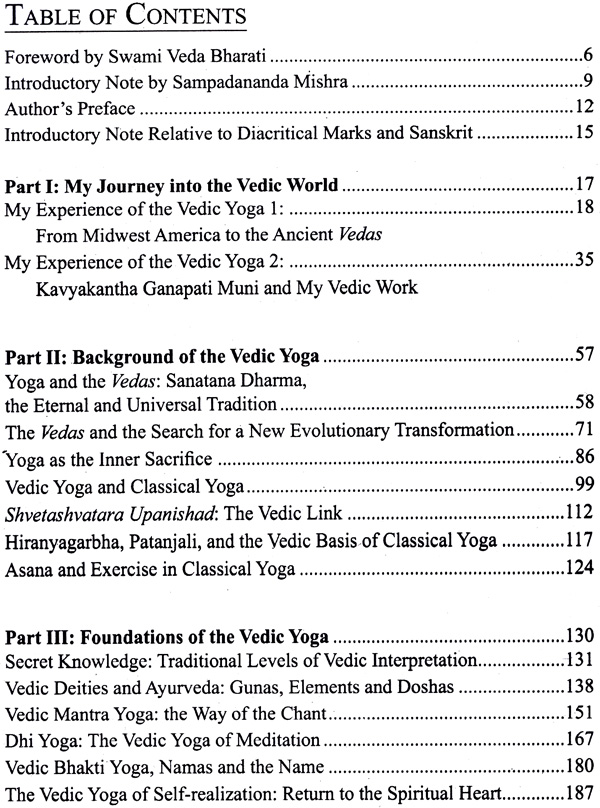

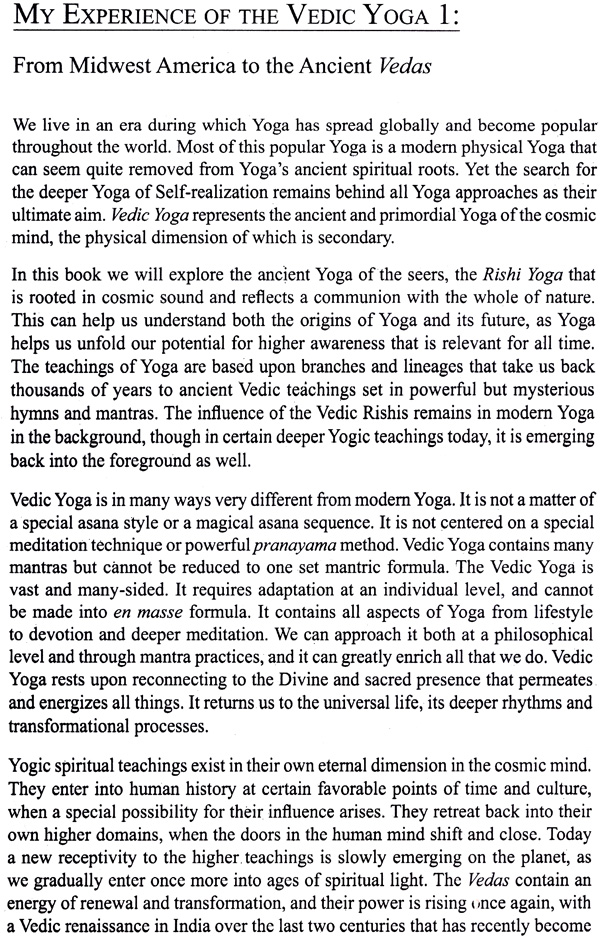
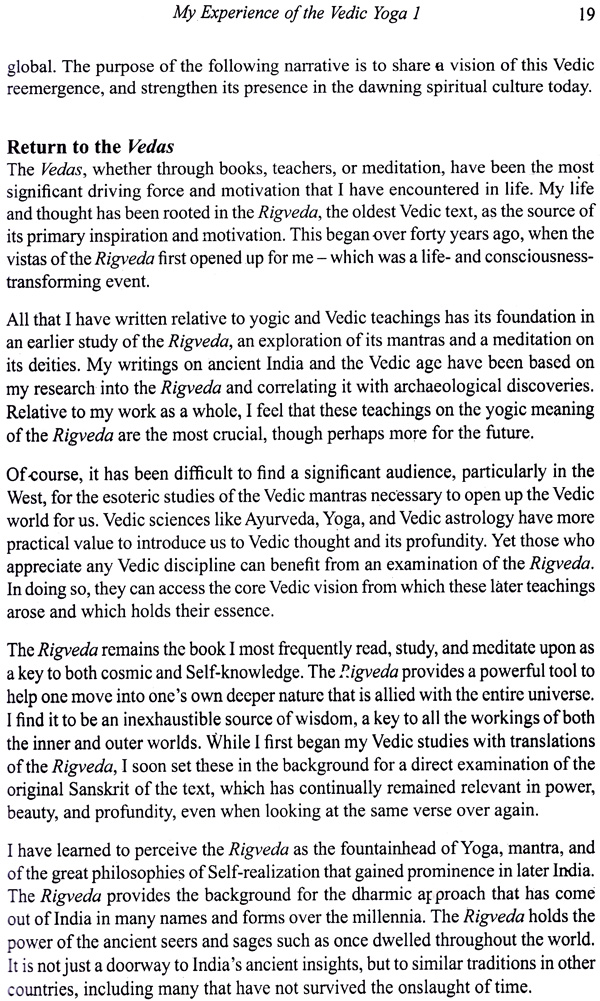
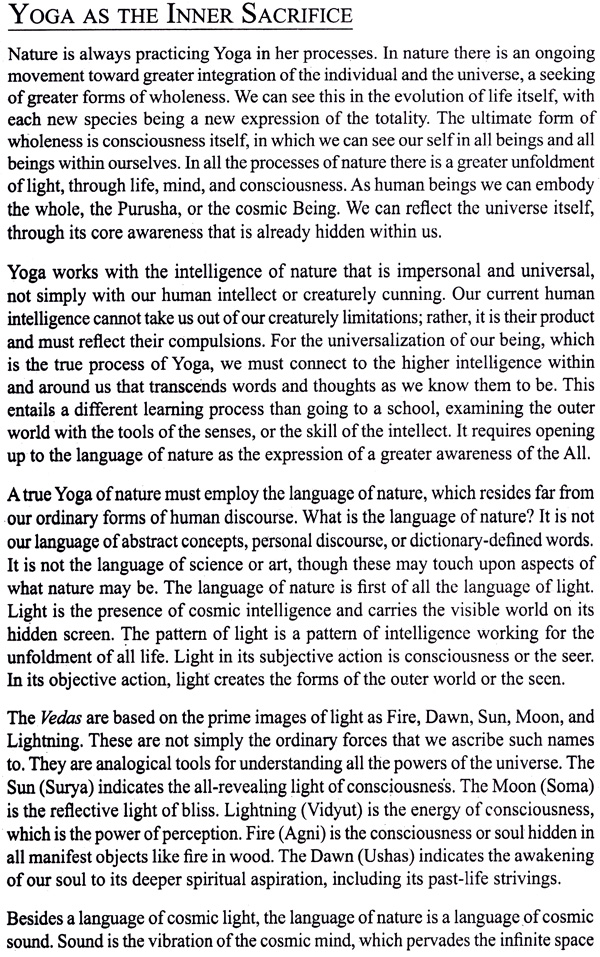
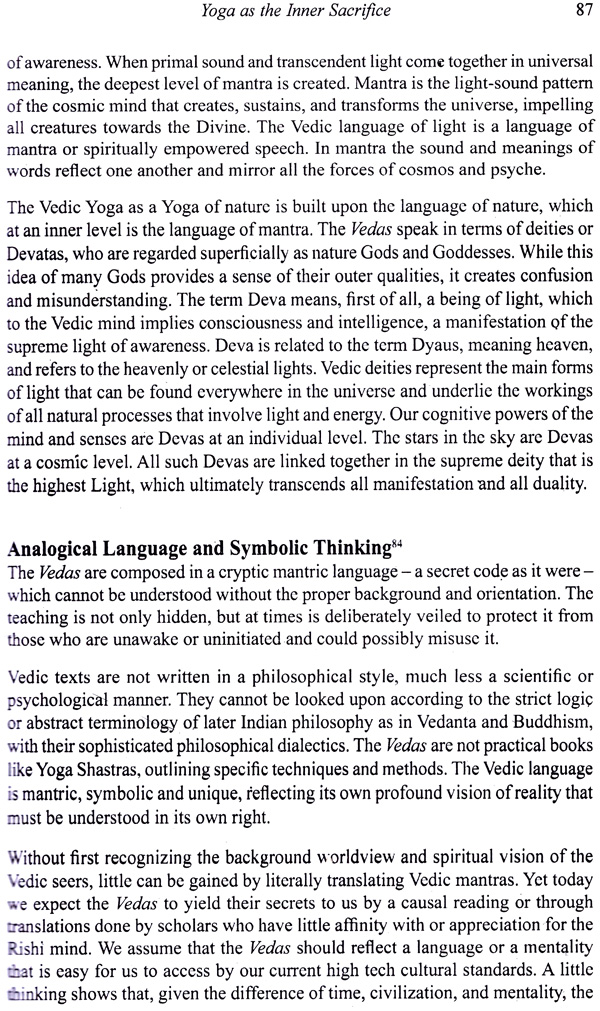
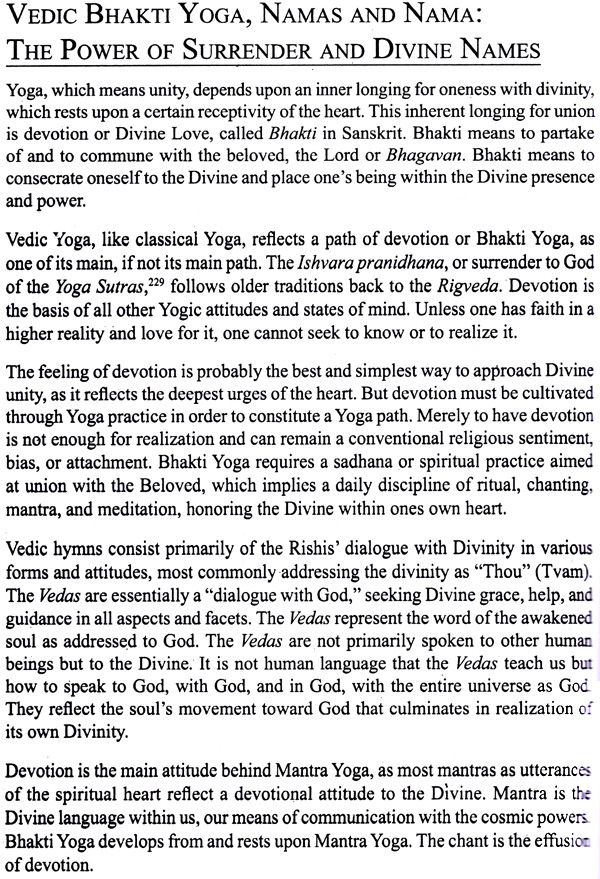
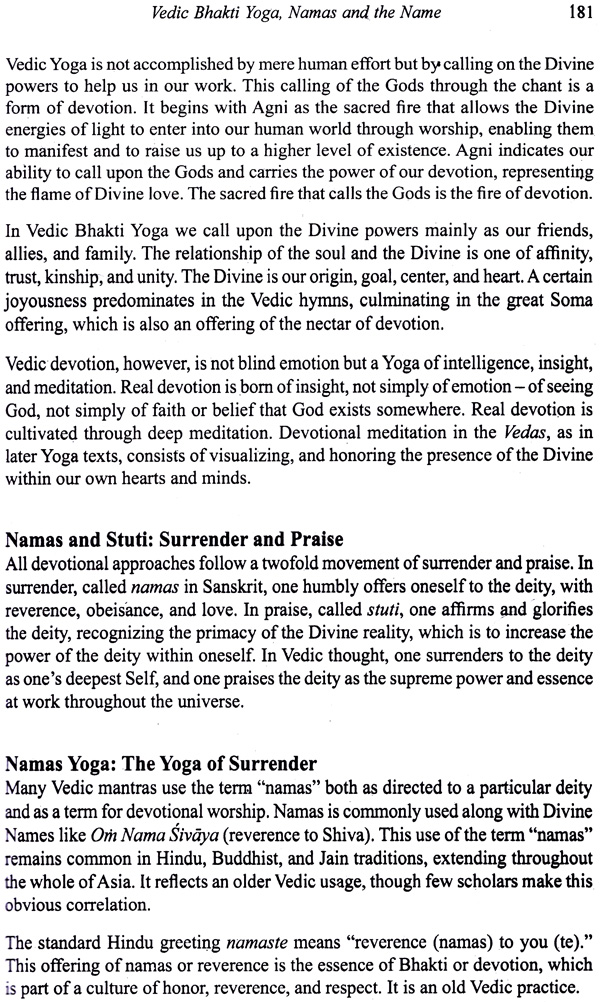
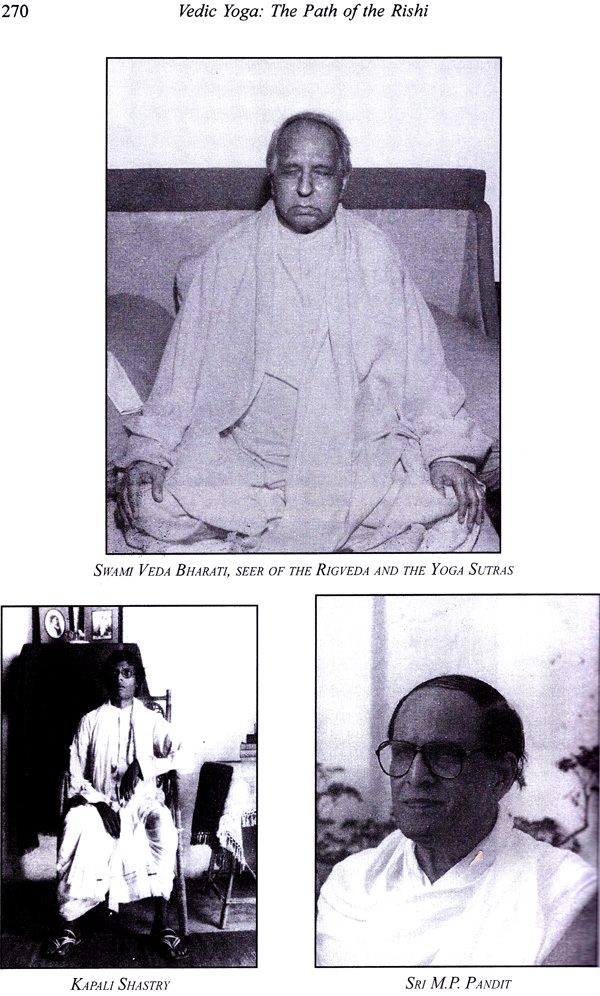

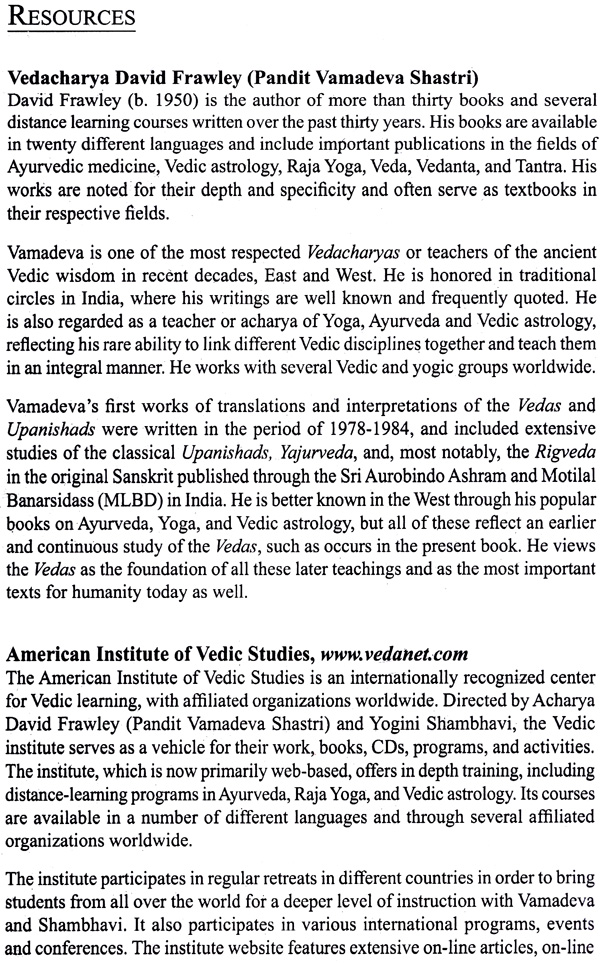

Delivery and Shipping Policy
- INTERNATIONAL SHIPPING
- Rs.1000-1100/kg
- ESTD. Delivery Time: 2-3 weeks (depending on location)
- Bubble Wrapped with Extra Padding
- NATIONAL SHIPPING
- NCR: Rs. 30/half kg
- Standard: Rs. 80/half kg
- Express shipments also available on Request
- ESTD. Delivery Time: Ranging from 1-4 days up to 7 business days (Depending on your choice of Delivery)
- TRACKING
- All orders; national or international, will be provided with a Tracking ID to check the status of their respective orders
- Depending on the Shipping Service, Tracking ID may be used on their respective tracking portals
Frequently Asked Questions (FAQs)
Domestic Shipping: 3-4 Days (after shipping)
International Shipping: 1-2 weeks (based on your location)
You will receive an email once your order has been shipped or you can email us if you didn't receive tracking details (info@mlbd.co.in)
Every book that we sell is the latest edition except all the rare books
Yes, we do provide free shipping, only on domestic orders (within India) above Rs.1500


